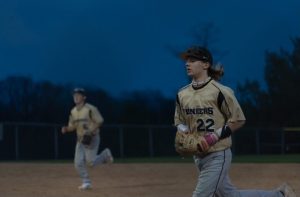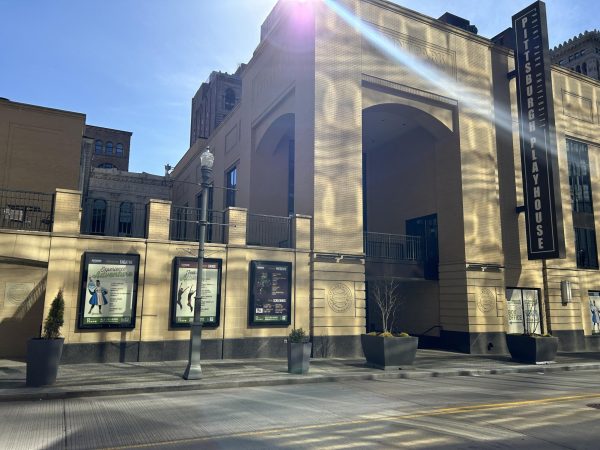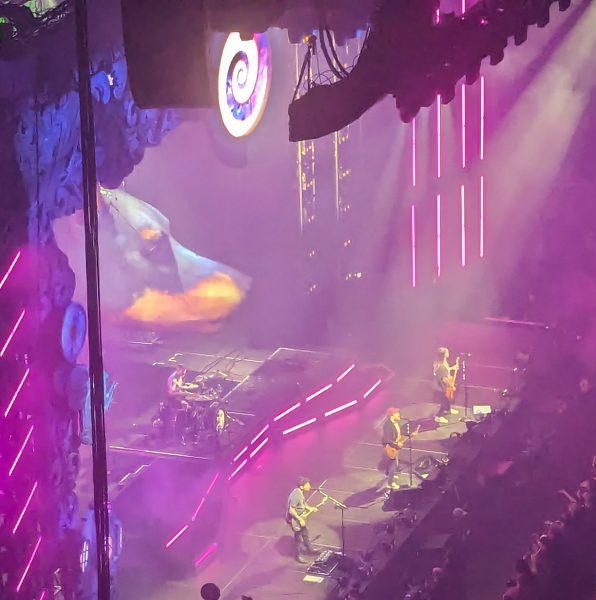“You on the Moors Now” demands to be heard
December 5, 2017
Crammed into the only remaining seat in the Studio Theater, bag tucked safely under my chair at the request of an usher, I waited with the rest of the audience for the lights to dim. Looking around, I wondered if I was the only one who had never heard of “You on the Moors Now,” or if I was the only one slightly frightened by the intimacy of the black box theater, and the box office’s warning that the actors would be “running through the aisles.” The lights finally went down, and the actors ran onstage, and so began what would become one of the most poignant, captivating and downright fearless productions I’ve ever seen.
The plot of “You on the Moors Now” is centered around four of the most well-known female characters in classic literature: Jane Eyre (Aenya Ulke), Jo March (Shannon Donovan), Elizabeth Bennett (Julia Small) and Catherine Earnshaw (Madeline Watkins). But these aren’t exactly like the stories you remember from high school. Instead of romantic garden proposals and “ardent” love, “You on the Moors Now” tells an alternate tale, set in a world where the women said “No.” In doing so, our female protagonists both literally and metaphorically reject the life written for them in favor of choosing the lives they want to lead.
A cast of 14 powerhouse actors from Point Park tackle this triple-act beast of a play, so full of plot twists and turns that you could get dizzy just from watching. The way the script switches from fast-paced comedy to abstract spoken word and movement could have easily baffled the audience, and turned this 95-minute, intermission-less production into a disaster. And when I say easily… I mean, there are countless ways this play could have gone wrong, and left the audience wishing for an intermission through which to escape.
Thankfully, the Conservatory’s production ran like a machine, seamlessly and perfectly executing each move, costume change and piece of intricate fight choreography as though the cast and crew had been performing it for years. The audience, as a result, didn’t miss a beat. But it was the confidence with which every actor delivered the abstract, and almost devised style of their production that really took “You on the Moors Now” to the next level.
There were truly no “weak links” in the cast. From Micah Stanek’s (Heathcliff) brooding power, to Wesley Ehle’s (Mr. Bingley, Old Mr. Laurence) impeccable comedic timing, to the incredible way each young ingenue transformed into strong, independent women over the course of the show- the cast of students absolutely blew me out of the water every time they stepped onstage.
The dialogue blends 1800s literature with contemporary feminism, quickly switching from the language of the original print to modern bursts of profanity, and vice versa. The costume designer (Terra Marie Skirtich) also aids in bridging the gap between the past and the present by dressing the actors in a combination of contemporary street clothing and period costume pieces.
I also have to give a special shoutout to the actors responsible for teaching dance and combat, respectively: Meghan Halley and Shannon Donovan.
“You on the Moors Now” is largely comedic, and the delivery of the unique, clever script had the audience laughing out loud for the majority of the performance. The jokes are largely directed at the male characters, all of whom are well-crafted, and completely hilarious, archetypes of different 19th century men. But you don’t need to know anything about Jane Austen, or the Brontë sisters, or history at all for that matter to understand the humor, or to follow the journey of the girls as they come into their own and discover how to fight.
While “You on the Moors Now” is undeniably funny, the reason that this production will stick with me for a while is not the humor; it’s the heart.
The passion each member of the cast, crew and production team brought to the show was impossible to miss. I was astonished by the teamwork and the bold commitment of everyone involved, and by the incredible bravery of the actors as they shared their pride and their pain with all of us. From the physical demand of the show, to the emotional vulnerability I witnessed firsthand, to the incredible amount of dramaturgy work required for a production like this, it’s incredibly clear that the cast and crew love what they do. As a result, the message of the show has come through without hesitation, and demands to be heard. The call to defy gender norms and social conventions is received loud and clear; it is a war chant, and the chant is “NO!”









